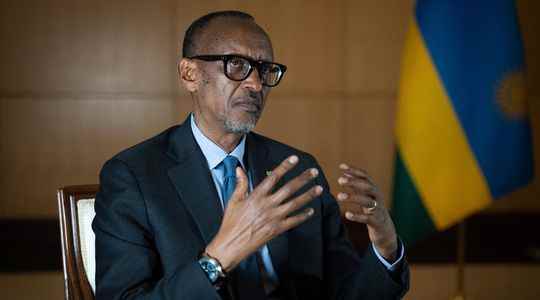Its swimming pool with a view of the hills of Kigali, its restaurant-terrace and its clean rooms: “Many Rwandans would dream of living there!”, ironically a Rwandan journalist who visited the Desir Resort, near the center of the capital. On May 19, the hotel opened its doors to the media for a perfectly oiled communication operation, intended to show the reception conditions for migrants from the United Kingdom who will soon be received here. The case caused a stir in mid-April when London and Kigali signed a five-year agreement to ship “asylum seekers who arrived illegally on British soil” some 10,000 kilometers away, to Rwanda. “One of the safest countries on the planet”, according to Boris Johnson, despite the allegations of torture, arbitrary detentions and extrajudicial executions targeting this police state.
At stake, for this small landlocked country in East Africa, the tidy sum of 141 million euros, or nearly 3.4% of its national budget. “There is of course a pecuniary interest, believes analyst and lawyer Louis Gitinywa, in Kigali. But President Paul Kagame is also investing, in the long term, in his soft-power. This agreement allows him to cultivate his image as an African statesman capable of proposing solutions to other countries.” With the same ambition, Rwanda has been exporting its security services for years. the main contributors to UN peacekeeping missions, but it has also signed bilateral agreements with the Central African Republic and Mozambique in 2020 and 2021, where Rwandan soldiers are deployed.
After military diplomacy, Paul Kagame is therefore relying on migratory diplomacy to extend his influence beyond the continent. But the former guerrilla, who fought the genocidaires in 1994, swears it: he only has noble intentions. The Head of State (for 22 years) never misses an opportunity to recall his childhood spent in a refugee camp in Uganda, at the time of the first anti-Tutsi pogroms which pushed his family into exile, dawn of the 1960s.
With Israel, a sinister precedent
And then, did he not welcome, from 2019, in partnership with the High Commissioner for Refugees (UNHCR), migrant victims of the worst abuse, stuck in Libya? “Hundreds if not thousands of people were trapped in prisons, starving, some abused, some enslaved. So I said, why don’t we fix this?” he said. recalled on April 26 in front of an audience of ambassadors gathered in Kigali, at the annual dinner of the diplomatic corps. Five hundred people have actually been accommodated each year since 2019 in the center of Gashora (1h30 by road south of the capital), before being resettled in third countries. “But this device is an emergency humanitarian response,” retorted UNHCR spokeswoman Catherine Stubberfield. In no case does it aim to outsource the asylum applications of thousands of individuals, contrary to the text signed in April by Rwanda and the United Kingdom.
The UNHCR and a number of associations deeming this agreement to be contrary to international law – legal action is underway against the British government – have reason to be concerned. Because a previous disaster exists. Before signing a contract with London, Kagame made a pact, in the greatest secrecy, with Israel. Between 2014 and 2017, the Jewish state sent thousands of migrants to Rwanda and Uganda. “It was a disaster for the deportees. The smugglers took advantage of this, as most of these people took dangerous routes to reach Europe,” said Steve Valdez-Symonds, refugee rights officer at Amnesty International in the Kingdom. -United.
Denmark, next on the list
Many observers fear a similar scenario in the coming months. “The migrants who will be sent here are not going to spend three years learning Kinyarwanda (the national language) to integrate into a country with an annual GDP per capita of 800 dollars! assumes a European diplomat in Kigali. vanish into the wild within weeks.”
By then, Rwanda will have received the British check and won in passing a weighty ally, a member of the United Nations Security Council. “The United Kingdom has placed itself in a position of dependence vis-à-vis Rwanda, which it is now forced to present as a safe place, continues Steve Valdez-Symonds. This makes it vulnerable to pressure policies.” Difficult, henceforth, to denounce human rights violations in Rwanda… The risk seems assumed, in London. And Boris Johnson’s attitude has visibly uninhibited other countries. Denmark could be next on the list. His government is currently negotiating a similar deal with Rwanda. It remains to be seen whether the European Union will let Copenhagen do its thing.
